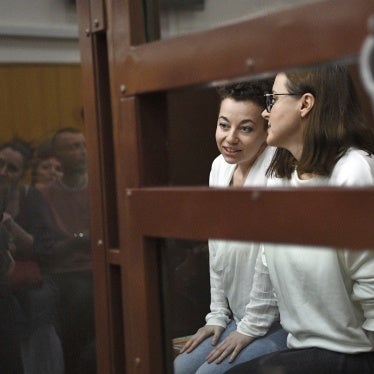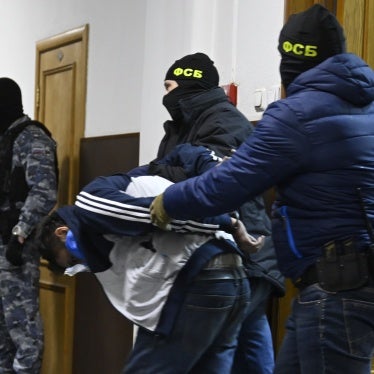The Russian government's prosecution of two former Guantánamo detainees for an explosion on a gas pipeline has been riddled with procedural irregularities and allegations of mistreatment, Human Rights Watch said today.
According to a document obtained by Human Rights Watch, a criminal suspect now in police custody confessed in July 2005 to the same crime for which the two men were convicted on May 5, 2006.
Earlier, in September 2005, a jury had unanimously acquitted the two former Guantánamo detainees, Ravil Gumarov and Timur Ishmuratov, as well as a third defendant, Fanis Shaikhutdinov, of the January 2005 explosion on a gas pipeline in Tatarstan, a republic within Russia several hundred miles east of Moscow. But prosecutors subsequently got approval from the Russian Supreme Court to annul the verdict so that the three could be tried again for the same crime.
On May 12, after a second trial, Gumarov was sentenced to a term of 13 years, and Ishmuratov to 11 years and one month. The third man, Shaikhutdinov, received 15 years and six months.
Gumarov told family members that interrogators pulled hairs from his beard and forced vodka down his throat, a particularly offensive form of ill-treatment for an abstinent Muslim, in an effort to get him to confess. Ishmuratov told his lawyer that interrogators warned him that they would call in his pregnant wife for questioning and could not guarantee the safety of the fetus. Ishmuratov’s mother told Human Rights Watch that security service officers brought Ishmuratov in handcuffs to the birth hospital to urge his wife to admit to whatever officers asked.
Both men confessed to the crime while in custody during the investigation, but recanted their testimony in court.
“This case shows precisely why the U.S. government should be screening Guantánamo detainees before sending them home,” said Carroll Bogert, associate director of Human Rights Watch. “Forcing people to go back to this kind of abuse is a clear violation of international law. Detainees at Guantánamo must have a chance to challenge their return.”
Under the Convention against Torture, the United States is prohibited from returning people to countries where they are at risk of torture. The U.S. government claims that it seeks “diplomatic assurances” of humane treatment from receiving states before a detainee at risk of abuse is transferred out of Guantánamo Bay. Diplomatic assurances from states where torture is a serious problem or in which specific groups are targeted for torture, including Russia, are inherently unreliable and do not provide an effective safeguard against torture and ill-treatment.
The U.S. government returned Gumarov and Ishmuratov, along with five other Russian citizens, from Guantánamo to Russia in February 2004. Their relatives said they were frequently harassed by local law enforcement authorities in Tatarstan until they were finally arrested for the pipeline explosion in April 2005.
Other ex-Guantánamo detainees in Russia have also faced repeated harassment and have been detained and ill-treated. Human Rights Watch will be releasing additional information about their treatment in coming weeks.
U.S. embassy officials in Moscow told Human Rights Watch that they were not making any efforts to assess the treatment of former Guantánamo detainees after their return to Russia.
“First the U.S. government detained these men for years without charge in Guantánamo, then it sent them back to Russia in violation of international law, and now it’s not even bothering to monitor their fate,” said Bogert. “Washington has got to start doing the right thing for these Russians.”
Prosecutors said the accused men hoped the pipeline explosion would “influence law enforcement authorities” to release other Muslims in a local detention facility and draw media attention to their plight. The explosion caused no casualties. It occurred on a small pipeline conducting heat to a residential area of Bugulma, in southern Tatarstan.
The defendants were convicted of terrorism (Article 205 of the Russian Criminal Code) and illegal possession of weapons or explosives (Article 222). They were also ordered to pay damages of about U.S.$2,000 for property damage.
Prosecutors said that on January 7, 2005, the men were in repeated telephone contact to plan the explosion on the following day. But according to their lawyers, telephone records showed that no phone calls between them, either by mobile phone or landline, were made on that date. Neither Ishmuratov nor Gumarov lived in Bugulma, where the explosion took place, and both said they were not in Bugulma on the day of the explosion.
Defense lawyers also said that the Islamic religious leaflets confiscated from Gumarov’s apartment – and described in the court’s verdict as “literature of terrorist intentions” – were in fact openly available in Russia and were not banned.
In a handwritten document that Gumarov’s mother said was smuggled out of the Bugulma detention facility before her son’s first trial, he writes: “Mama, don’t listen to the authorities, no matter what they say about me. … My nerves gave in, I couldn’t take it. I spoke against myself and the worst thing is that I spoke against others. Everyone has the limit for what they can take, and many break sooner or later. They broke me too. It seems I’m destined to serve time for what I didn’t do.”
Two other men told Human Rights Watch that police detained and beat them to force them to give witness testimony against the defendants. Timor Ishmuratov’s brother, Rustam Hamidullin, told Human Rights Watch that police from the Tatarstan organized crime unit detained him at his aunt’s house in Nefteyugansk, in Khanti-Mansiisk province on March 31, 2005. Police held him for several days at the Nefteyugansk police station and beat him while he was handcuffed to a radiator to coerce him to admit that he had witnessed preparations for the crime. Police then took him on the train to Tatarstan. Hamidullin told Human Rights Watch that he was kept in a regular compartment of a passenger train and tortured during the two-day train trip.
Another witness for the prosecution, Ildar Valeev, told Human Rights Watch that on April 1, 2005, he was called in for questioning to the organized crime unit in Almetievsk, Tatarstan, and subsequently sentenced to five days’ administrative arrest for swearing in a mosque. He was held in an investigation cell in Bugulma, where he was stripped, beaten and subjected to threats and psychological pressure until he agreed to sign a statement saying he had witnessed the explosion. He was only released on April 27, 2005.
Both Hamidullin and Valeev recanted their coerced statements at the trials.
The five-page confession to the Bugulma explosion is signed by Vilsur Khairullin, who is accused in a separate case of conspiring to blow up key industrial targets in Tatarstan in 2005. According to the document, the interrogation was conducted by an investigator in the serious crimes division of the Tatarstan procuracy, V.A. Maksimov, on July 7, 2005 between 10:10 am and 1:00 pm. In the confession, Khairullin says that he planned and executed the explosion alone. Gumarov and Ishmuratov were in custody at the time Khairullin made his confession, awaiting trial for the same crime. Yet prosecutors never mentioned the confession to lawyers for either defendant.
Investigator Maksimov told The Washington Post that investigators took Khairullin to the scene of the crime and that he was unable to identify the exact location of the explosion, so they did not feel it necessary to inform defense lawyers about his confession.
Police in Russia frequently use torture and ill-treatment to extract confessions.
“Defense lawyers for Gumarov and Ishmuratov should have been told about the confession,” said Bogert. “And if the confession wasn’t genuine, that begs the question: what methods did investigators in Tatarstan use to extract it?”
After a jury acquitted the three men in September 2005, the Tatarstan procuracy filed a request with the Russian Supreme Court to annul the verdict. In an interview with Human Rights Watch, the public prosecutor of Tatarstan, Kafil Amirov, said, “We think the jurors took this case too lightly. They didn’t fully understand … they’re simple people.” He denied that the second trial constituted double jeopardy, which violates both Russian and international law.
Defense lawyers for all three defendants have appealed the conviction to the Russian Supreme Court.








